Written by Edward Whelan, Contributing Writer, Classical Wisdom
Many of us are familiar with stories from the Greek myths. However, our knowledge of them is often imperfect. Many of us hear the story of Atlas, the Titan, but few of us know the full story. The story of Atlas and his fate is one of the most important in all of Classical Antiquity. There are many variations of the myth of Atlas and some of them are discussed here.
The Origin of Atlas
It is likely that the story was based on a Pelasgian myth, a myth belonging to the original inhabitants of Greece. Most myths relate that Atlas was the son of Iapetus, a Titan. Iapetus was the son of Uranus and Gaia, and one of the divine beings who ruled the world before the reign of the Olympian deities. The identity of Atlas’s mother is not known but it may have been an Ocean nymph.
Atlas was very strong and one of his brothers was Prometheus. In some accounts, he had many children, mainly daughters. The Titan fathered many nymphs including the Hesperides and the Pleiades. The nymph Calypso, who played an important role in the Odyssey of Homer was also his daughter.
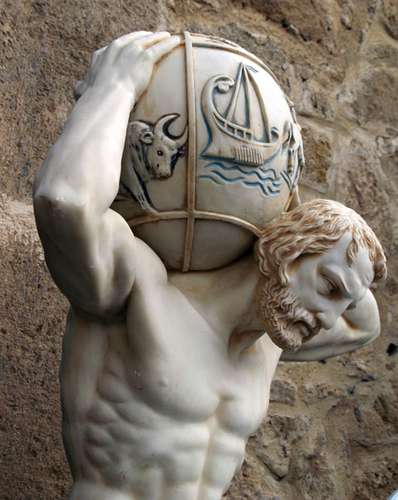
Statue in Paphos, Cyprus, depicting Atlas bearing the celestial globe.
Atlas was to play a very important role in the Titanomachy. This was a ten-year struggle between the old and the new gods in Greek mythology for the control of the cosmos. On one side was Cronus and his family members, known as the Titans, and on the other side were the Olympians, the children of Cronus, led by Zeus.
Atlas sided with the Titans and proved himself to be one of Zeus’s greatest foes. According to the myth, the Olympians feared him greatly. However, in the end, the Olympians were triumphant, and they utterly vanquished the Titans. Zeus imprisoned Cronus and the other Titans in Tartarus, which in Greek mythology is the underworld or hell.
The Punishment of Atlas
The Olympians gods hated and feared Atlas, so they devised a special punishment for him. Zeus condemned Atlas to stand at the western edge of the Earth. He placed the sky on his shoulder and forced him to hold it up for all eternity. Atlas had to use all his might to bear the weight and he suffered greatly.
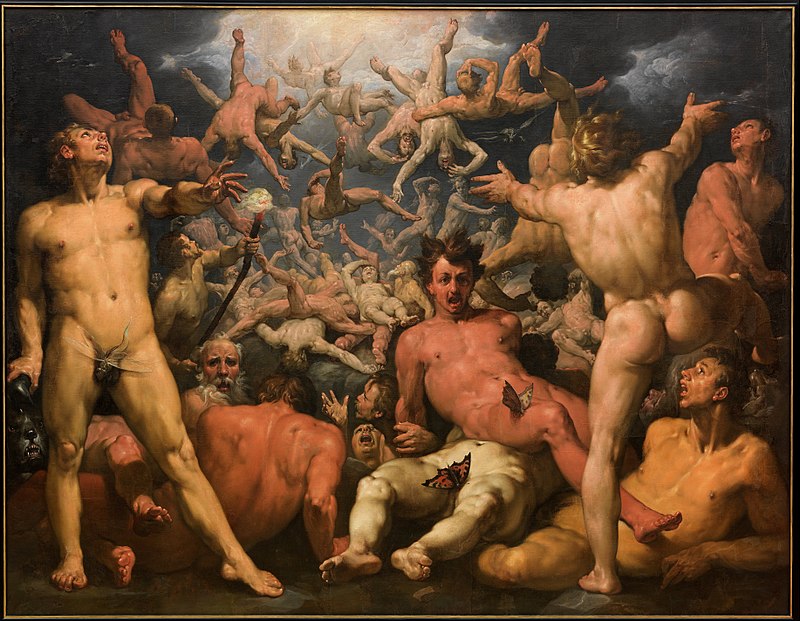
Cornelis Cornelisz van Haarlem, The Fall of the Titans, 1596-1598
A misconception arose in later centuries that he was condemned to hold up the earth. This was probably a result of Renaissance-era artworks, based on misinterpretations of the original myths. The Greeks, who lived in a pre-scientific age, believed that Atlas held up the sky in the area where modern Morocco is located. Many believe that the Atlas Mountains are named after the mythological figure, so cruelly punished by Zeus.
Other Versions of the Greek myth
Myths are never fixed, and they are constantly changing and growing. There are a number of myths about Atlas. According to Plato, Atlas was the first king of Atlantis, the legendary kingdom. However, Plato’s myth is a political fable and the story of Atlantis was designed to illustrate the political hubris of kingdoms and city-states.
Another well-known story involving Atlas appears in Ovid. In this, he is a king in a distant land and is visited by the great hero Perseus, who was a son of Zeus. When Atlas heard this, he grew fearful as he was told a prophecy that a son of Zeus would kill him. Thus, he refused Perseus hospitality, which was a serious transgression in Greek culture. Perseus, in retaliation, turned Atlas into a huge block of stone or a mountain. This is believed to have been an origin myth that explained the origin of the Atlas Mountains.
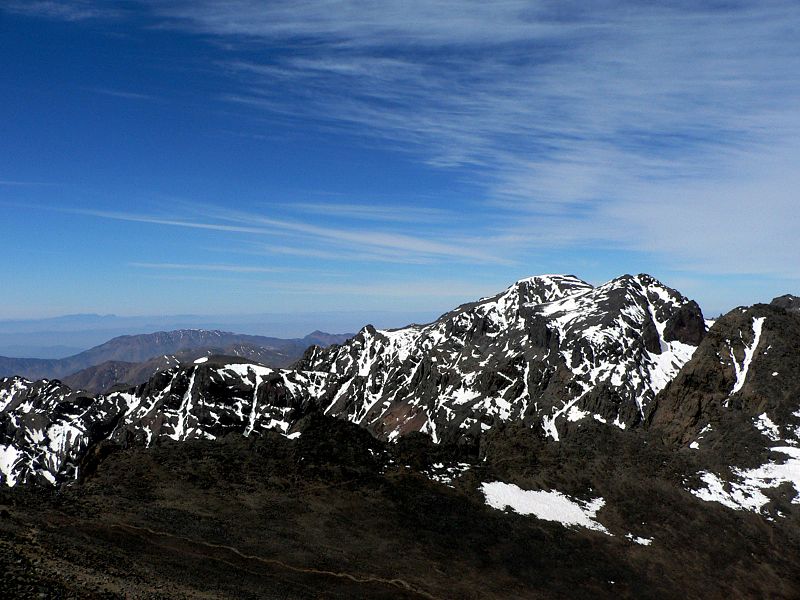
View of the saddle under Jebel Toubkal (3,940 m or 12,930 ft elevation), from the final ridge
In another myth, Hercules, for one of his labours, had to steal the golden apples in Hera’s Garden. This was guarded by Atlas’ daughters. Hercules asked Atlas to steal the apples and in return, he would hold up the sky for him, for a period of time. Atlas kept his word and stole the apples. In one version of the myth a grateful Hercules built the ‘Pillars of Hercules,’ and these were used to hold up the heavens and free the Titan. In another version of the myth, Atlas tried to trick Hercules into holding up the sky permanently, but the hero was too cleaver and escaped.
Atlas, the First Astronomer
Possibly, because of Atlas’s association with the heavens, he was widely regarded as the first astronomer. In some myths, he is the inventor of the first celestial sphere or body and other astronomical instruments.
The Legacy of Atlas
The myth of Atlas is an enduring one. The popularity of the myth can be seen in its continuing influence. It is widely believed that the name of the Atlantic Ocean is derived from the name of the Titan. This is because his mythical kingdom of Atlantis was located in this great body of water.
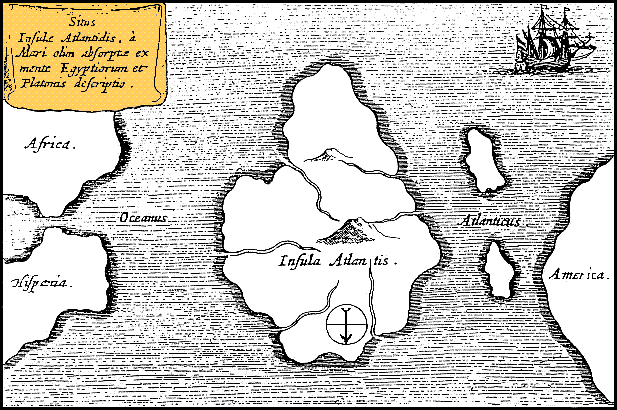
Athanasius Kircher’s map of Atlantis, placing it in the middle of the Atlantic Ocean, from Mundus Subterraneus 1669, published in Amsterdam. The map is oriented with south at the top.
In the 17th century, cartographers were mapping the world. The great cartographer Gerardus Mercator (1512-1594) published a collection of maps and he named it in honor of the Titan. Hence, the name for a book of maps is Atlas.
Conclusion
The story of Atlas is one that still fascinates people and remains popular. The story of the Titan was used by the Greeks to explain why the sky was able to stay in place as well as the origin of astronomy. He also played an important role in other myths including that of Atlantis. The figure of the Titan holding up the sky or earth is one that is very influential and has inspired many artists.

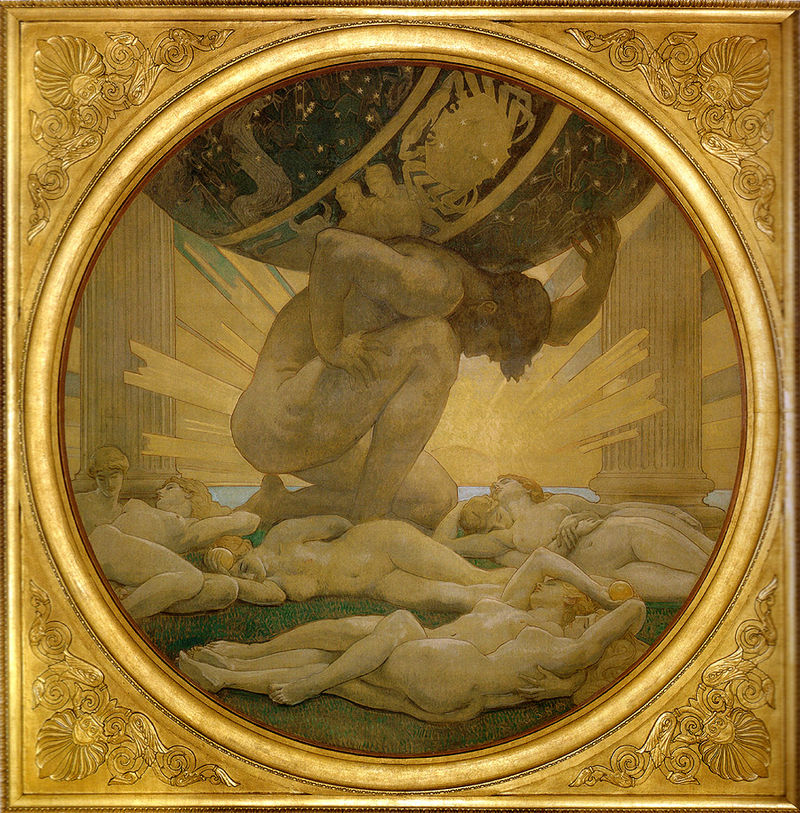








One comment
Thank you for the information. I’d very much like to know whose painting is at the top of the page. Since there are seven women, they might be Atlas’ daughters, the Pleiades?
Our apologies, you must be logged in to post a comment.